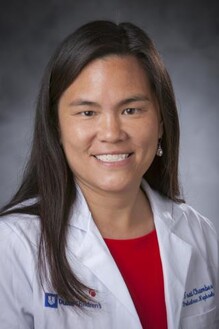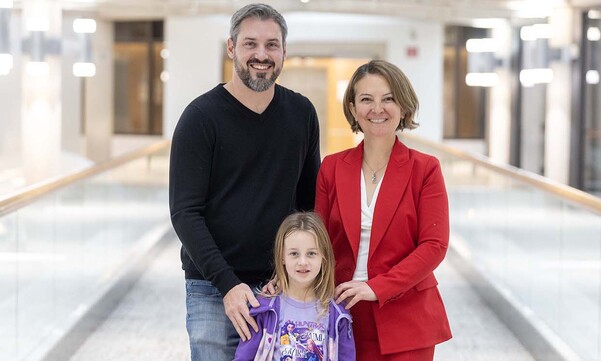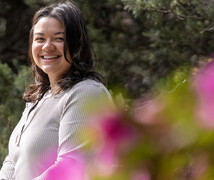After battling kidney disease his entire young life, 11-year-old Kaleek Beatty got the best present he could ask for, just five days before Christmas 2016. Duke Children's Hospital called to say they had found a kidney for him.
Born with Kidney Disease
Ask a typical 11-year-old, “What do you want to be when you grow up?” and you’re likely to hear “sports superstar” or “rock musician.” Ask Kaleek Beatty, though, and his unhesitating reply is, “kidney transplant doctor.”
“I want to be able to help other kids the way the doctors at Duke helped me,” answered Kaleek, reflecting the same upbeat, can-do attitude of his mom, Latisha, and dad, Corey. Latisha added, smiling, “If Kaleek says he’ll be a doctor helping kids with kidney disease one day – count on it.”
Kaleek was born with posterior urethral valves (PUV), a condition that affects about one in 8,000 boys and occurs when a boy is born with extra flaps of tissue in the urethra, the tube that leads from the bladder to the tip of the penis. The flaps block normal urine flow, which can cause painful and frequent urination, recurrent urinary tract infections, and urinary backflow (when urine flows backward from the bladder into the kidneys). This can lead to tissue damage and chronic kidney disease.
Living a Normal Life Despite Kidney Disease
For the first 10 years of Kaleek’s life, Duke pediatric nephrologists and urologists worked together to tailor his treatment. This included constant monitoring, dietary choices, and medications to control his blood pressure, balance his electrolytes, and strengthen his bones. He also had surgery to address the blockage in his urinary tract.
When he was four, a small opening was created in Kaleek’s bladder through the abdomen to allow urine to flow more easily. The procedure let Kaleek grow and develop as normally as possible, and delayed the progression of his chronic kidney disease.
The strategy worked. Kaleek lived a relatively normal life until about a year ago.
Time for a Kidney Transplant Arrives
Kaleek’s team -- including pediatric nephrology, urology, and transplant -- knew he would eventually outgrow his damaged kidneys. “Our doctors’ long-term strategy and collaborative effort enabled Kaleek to avoid dialysis and at the appropriate time move directly toward kidney transplantation,” said Dr. Eileen Tsai Chambers, MD, medical director of Duke’s Pediatric Kidney Transplant Program.
“Increasingly, my son could walk only short distances before he’d get tired,” said Corey. “If he played basketball on Saturday morning with his team, it would take the rest of the day to get his energy back. More and more, Kaleek needed frequent restroom breaks. He even asked me, ‘Dad, how come I’m different now?”
“Kaleek was born with chronic kidney disease. As puberty nears, many of these children outgrow their limited-functioning kidneys and require either dialysis or kidney transplantation,” Dr. Chambers said.
In Kaleek’s case, the time for a kidney transplant had arrived. To prepare his bladder for the transplanted kidney, his kidney specialists used an innovative balloon catheter, developed at Duke, to close the small opening in his bladder. Kaleek was placed on the transplant waiting list.
A New Kidney for Christmas
“My heart almost stopped when Dr. Chambers said, ‘let’s get Kaleek a kidney,’ recalled Latisha.
The kidney became available in December 2016.
“It was really exciting when they called to tell us they’d found a donor, said Corey. “We almost didn’t believe it. We prayed and laughed and cried, and then we prayed and laughed and cried some more. This truly was our Christmas miracle.”
Although aspects of Kaleek’s transplant were challenging, and kids with PUV are at high risk for complications after transplantation, everything went beautifully. “As soon as we put the kidney in, it started to function,” said Dr. Chambers. “Kaleek now has better blood pressure and overall health, and way more energy. He takes anti-rejection medications and comes to Duke for monthly follow-up visits.”
Back to Just Being a Kid
Today, Kaleek is looking forward to a sixth-grade schedule packed with studies, friends, basketball, and even learning to play the sax.
“I used to worry about Kaleek every minute of every day,” said Latisha. “But, no more. That part is over. My son is back in the business of just being a kid.”
“In all honesty,” said Corey, “how do you begin to say, ‘thank you’ to the doctors and nurses who have made your child whole? They were there for us 24/7. It was like we were all family. I am not a man given to easy compliments or mush, but I cannot begin to do justice to the love and gratitude my family and I have in our hearts for Duke.”






